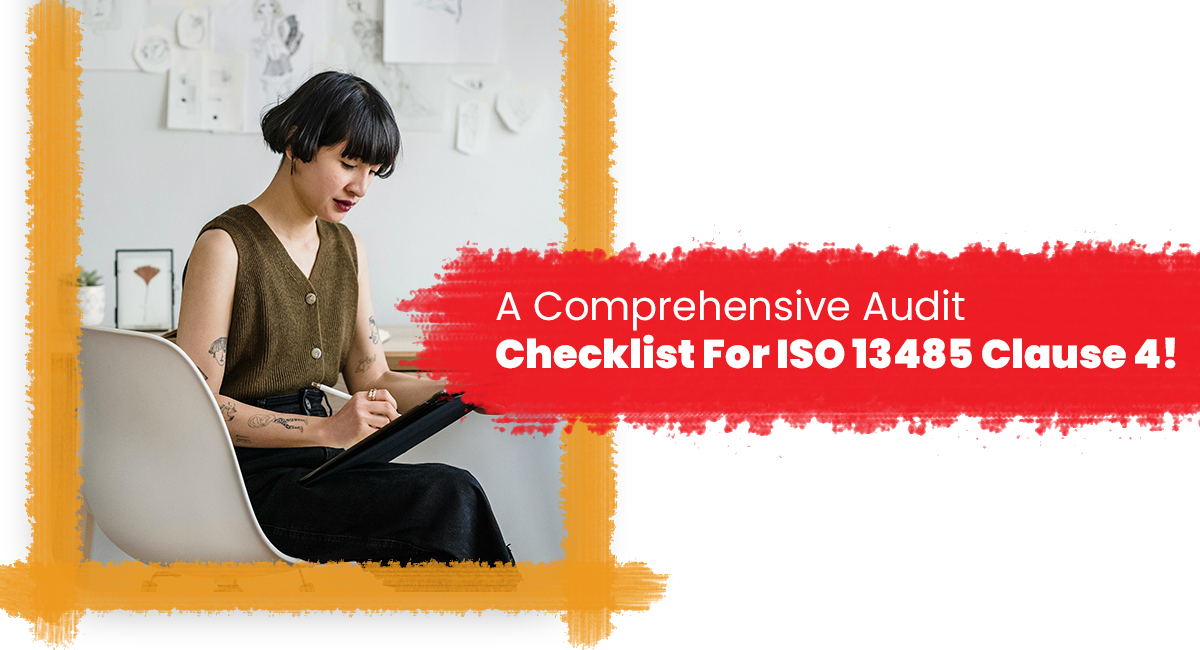As expert auditors with sufficient industry experience, it’s understandable when business owners get anxious before a third-party audit.
One of the most effective ways to deal with this unease and ensure you are following the correct path is creating a comprehensive ISO 13485 audit checklist and evaluating your medical device quality management system.
It can help you understand the additional requirements you have to meet, the potential room for improvements, and identify the flaws in the system.
To help you get started, we present a sample audit questionnaire or checklist for clause 4 of ISO 13485.
So, if you are seeking effective ways to evaluate your company’s environmental management system, delve into the below section now!
An Expert-Approved Audit Checklist For ISO 13485 Clause 4!
Clause 4 presents the first set of requirements of ISO 13485. It focuses on establishing a medical device QMS, documenting it and related roles and responsibilities, creating quality manuals and policies, and controlling documents as well.
Here’s an ISO 13485 audit checklist solely designed to help you ensure compliance with the Clause 4 quality management system.
So, let’s get started!
4.1 General Requirements
• Has your organization established, documented, implemented, and maintained an effective medical device quality management system? Have you improved the existing system according to the requirements of ISO 13485?
• Has your organization identified the processes required for the quality management system? Have you planned their application through your organization?
• Have you taken a risk-based approach to the control of the quality management system processes?
• Have you determined the interaction and sequence between the quality management system processes?
• What criteria and methods does your organization use to ensure the effectiveness of the control of quality management system processes and operations? Include them in your ISO 13485 audit checklist for a thorough review.
• Has your organization provided all the resources required to support the operation and monitoring of the medical device quality management system processes?
• How does your company monitor, measure, and analyze the ISO medical device quality management system processes?
• How has your company implemented the actions needed to achieve the QMS objectives and maintain its effectiveness?
• Are the processes of your medical device QMS managed according to the requirements of the ISO 13485 medical device quality management system?
• Does your organization outsource any processes that affect its products, services, or compliance? If yes, then how do you plan to control those processes?
• Where is the control of outsourced processes affecting product conformity in regard to the requirements of the ISO 13485 medical device QMS?
• Do you have a plan for validating software before using them? Include your processes for evaluating the plans in the ISO 13485 audit checklist.
4.2 Documentation Requirements
• Have you documented the statements of quality objectives and quality policy?
• Have you established a quality manual?
• Does your company have documented procedures required by ISO 13485?
• Do you have the appropriate documents to ensure effective planning, control, and operation of the organization’s processes?
• Have you considered the required records when creating the documentation?
• Are there any other documents required by laws and regulations?
• Can you show your auditors the medical file for each model of medical device, including documents with product specifications and meeting other ISO 13485 requirements?
• Does the quality manual include the scope of the QMS, including details of justification for excluding requirements that apply to your QMS?
• Where does the quality manual reference the documented procedures established for the QMS?
• Where does the quality manual contain a description of interactions between the processes of the QMS?
• Where does the QM outline the documentation structure of the quality management system?
• Have you established controls to prevent the deterioration and loss of documents as well as identify and distribute the documents? Then, be sure to include them in the ISO 13485 audit checklist!
A Few Details To Remember When Complying With ISO 13485 Clause 4!
Document control is a major feature of ISO 13485. Hence, ensure you make no mistake when complying with it. Note down these details to prevent errors when structuring the audit checklist.
Document Control Specifications In ISO 13485
• ISO 13485 recommends developing document control processes and procedures to
• Review and approve documents for appropriateness before using,
• Update and re-approve the documents as necessary,
• Identify the current revision status and changes made to the documents,
• Ensure the availability of relevant versions of the applicable documents,
• Ensure the accessibility, readability, and legibility of the documents,
• Identify and control the distribution of external origin documents,
• Prevent loss and unintended use of outdated documentation.
The Most Commonly Made Mistakes Regarding Documentation Control!
When crafting your ISO 13485 audit checklist, make sure to check on these three mistakes most organizations make when documenting control.
• Using obsolete documents or documents without prior approval or review,
• No defined controls to prevent the use of outdated documents or loss of documents,
• No procedure for tracking the revisions and changes in documentation.
Ensure to assign the ownership of key documents to named individuals to prevent their loss. Also, communicate the contents of the documents properly to your employees. Make sure they are able to answer queries from auditors.
Endnote
The extensivity of ISO 13485 can make it a challenging standard to meet. Hopefully, this ISO 13485 audit checklist will help you stimulate this process. Also, you can use this checklist to create similar lists for other clauses. Additionally, you can use it as a tool for readiness review or a pre-audit analysis.


